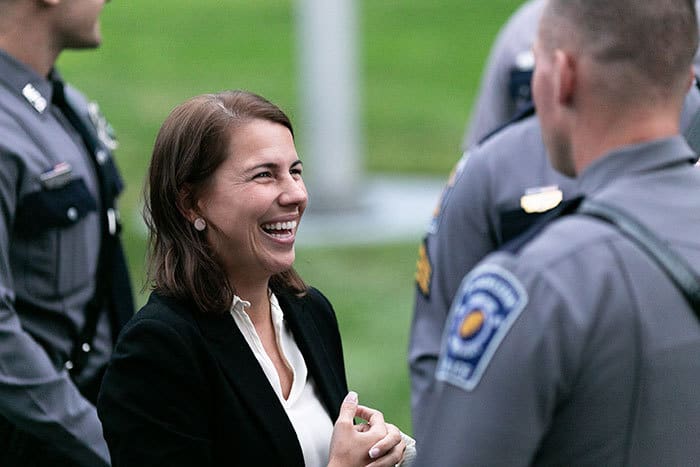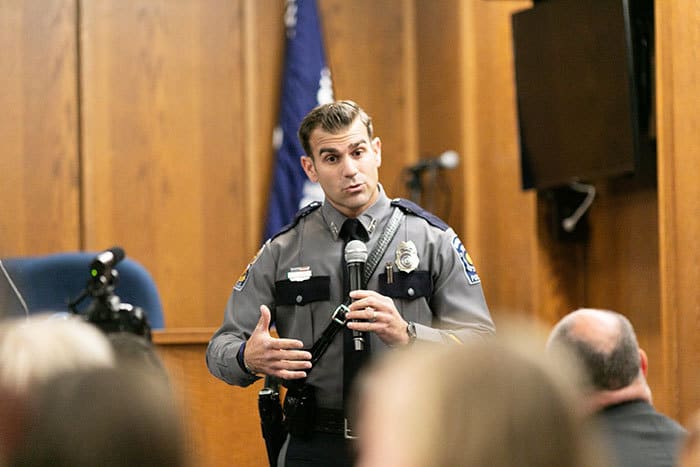
MANCHESTER – There are children and their families pouring into the courtroom of the Manchester municipal building, where the 6 p.m. council meeting will soon commence.
The children range from pre-kindergarteners to tweens, who greet each other with squeals and quick side hugs. They’re all wearing street clothes. It seems unlikely they all attend the same school.
“Do you know why they’re here?” one woman turns around to ask.
“No. There’s nothing on the agenda about this,” said another woman.
And, it seems true. No sports awards or academic medals, although anyone who knows the school community would recognize Superintendent David Trethaway and Manchester Township Elementary School Principal Linda Waldron. Why are they here?
Police Chief Lisa Parker’s presence isn’t unusual either, but the number of officers flanking her is. Five? Why are they here?
Municipal Clerk Sabina Skibo reads through the Open Public Meetings Act, and after the flag salute, recites the roll call. She then reads through a proclamation – not at all unusual – that Sept. 16, which has already passed, is Usher Syndrome Awareness Day in town.

Mayor Kenneth Palmer stands before the dais and starts talking about a girl who is on his daughter Molly’s softball team, and how she is a key player. His son Evan is in this girl’s grade. Evan says she’s smart. Palmer said. Like, really smart.
And then a family of five comes up to the front: mom, dad, and tween girl with her little brother and sister: Carly and Paul Fredericks, with elementary school age children Mason and Miley, and 12-year-old Ava Bullis.
It’s Ava. Ava is why they’re all here.
Ava is athletic. Ava is whip smart. Ava has Usher syndrome.
According to the National Institute’s of Health’s National Institute on Deafness and Other Communication Disorders, Usher syndrome is an incurable condition that causes hearing loss and deafness, vision loss, and can affect balance. Those with the syndrome are often born with moderate to profound hearing loss, and develop an eye disease called retinitis pigmentosa (RP), which initially causes night blindness but eventually narrows the field of vision so those affected have tunnel vision.
There are three types of Usher syndrome. Type 3 children appear normal at birth and develop problems as they age. Type 2 children are born with moderate to severe hearing loss but normal balance, and develop RP as adolescents. Type 1 children are born with profound hearing loss or deafness at birth and have severe balance problems. Vision problems begin before age 10, and many will be become completely blind. Most of these children will not walk unassisted before 18 months due to severe balance problems. DNA testing is the only testing to determine the true genetic type. It is estimated that it affects between four and 17 per 100,000 people.
Ava has Type 1. She was diagnosed in April 2009. She has cochlear implants. Ava has night vision and some peripheral vision loss.
Her family moved to Manchester two years ago, looking for a bigger home while wanting to stay in a community that felt intimate, close knit.
“Our biggest fear is that we wouldn’t find a friend or family who would support us and really understand what her needs were,” Carly Fredericks said. “So the fact that we’re standing here a little over two years later with a room full of individuals from the school, community, our friends, we really feel that we found our people. That’s something we don’t take lightly in our family.”
Carly Fredericks is the founder and president of Ava’s Voice, an advocacy and financial assistance nonprofit organization that educates the public on Usher syndrome.
She presented Trethaway and Waldron and other MTES staff, as well as Parker and the officers, the Ava’s Voice Community Impact Award. The award goes to those who showed exemplary commitment to educating all students, including those who are deaf-blind. The work with Ava that MTES staff did will serve as model for other education professionals who work with deaf-blind students, Carly Fredericks said.
“When we first met you, and we had the opportunity to meet Ava, we were all so excited about what she was going to teach us, and what a switch that is, because we’re the ones usually doing the teaching,” Waldron said. Nicole Raia was Ava’s teacher. “…The relationship that we built, we will treasure forever.”
Carly Fredericks said anyone who knows her daughter knows she is very competitive, and most competitive against herself. Ava loves sports, and can be found with the boys playing football and running around. Despite that, she was hesitant to let her daughter join the Manchester Township Police Youth Academy for sixth-, seventh- and eighth-graders in August.
“Most people see her and don’t even realize that, right now, in this room, she has about 40-degrees of vision. And if she did not have her cochlear implants on, she would not be able to hear anything,” Carly Fredericks said. “So, it’s always hard for me, when she’s ready to make those decisions, how that’s going to be and how do I share that with the community?”
She needn’t have worried. Ava’s application was accepted, and she was integrated into the program like any other kid.
“So when I walked her up to that door I said, ‘She has hearing loss and vision loss,’ and the other officer that was standing there said, ‘Okay. She can go right down that hallway,’ and I said, ‘Okay,’” Carly Fredericks. “So, it’s been moments like that we have been turned away. There have been many doctors that told us they wouldn’t serve us because it was hopeless. So, I get a little emotional, because I don’t think you realize the impact that that makes, just to say ‘yes’ and give it a chance.”

That was the best week of Ava’s young life, Carly Fredericks said. She presented the Manchester Township Police Department with their own Ava’s Voice Community Impact Award. Their accepting Ava showed the department’s commitment to equal access to typical youth experiences and teaches those with challenges that “anything is possible.”
“Ava has a special place in our hearts,” Officer Chris Cerullo said. While some kids are at first intimidated by the badges, Ava was never like that. “…You turn your back, and Ava was down here in two seconds marching, saluting. She was better than most of the cadets that we see in the real cadet academy. She was phenomenal. She was probably one of the best athletes I’ve had in this academy.”
Ava so impressed the department, that when she ages out of the Youth Academy, she’s been invited to be its first juvenile instructor. All with Chief Parker’s blessing.
So after the presentation, everyone who came to see the proclamation and awards given gathered outside the municipal building for a group photo. Then everyone broke off into their own little groups on the lawn, chatting, catching up, some children running around on the grass. Ava and a group of her middle school friends play “rock, papers, scissors” and break out into peels of laughter after each round.
“I had this fear, that will she be accepted,” her mom said, standing off a ways. “We have always taught her to be herself. It is nice to see her being loved an accepted for who she is.
“To us, she’s just Ava.”





